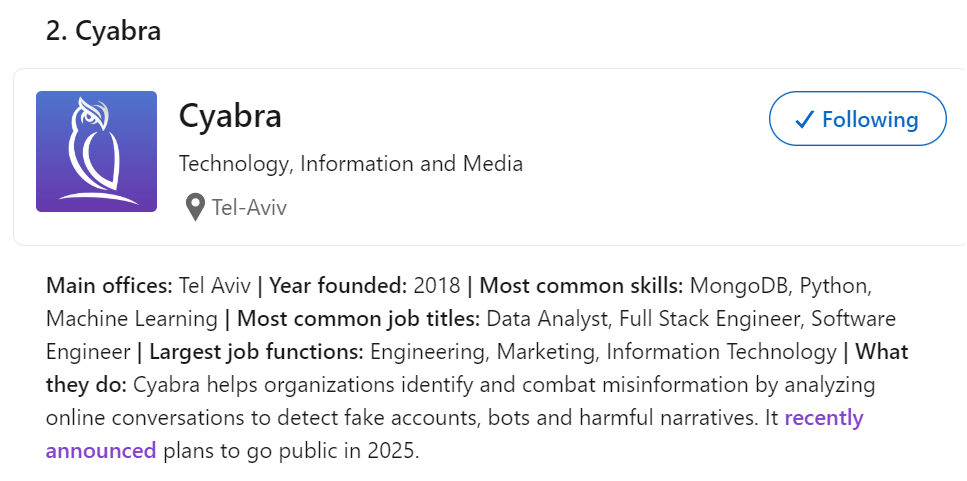LinkedIn’s Top Startups list spotlights 15 emerging companies that are making waves and shaping the future. We’re excited to share that Cyabra has made its debut on this prestigious list, securing the #2 spot, just behind the industry-leading cloud security company Wiz.
It’s an incredible honor to be recognized by LinkedIn’s experts and to stand among such an impressive lineup of companies driving innovation and growth in their respective fields.

Cyabra – #2 on LI top startups
Want to stay updated on Cyabra’s latest news and innovations? Follow us on LinkedIn and be the first to know!
The criteria for LI’s top startup list are based upon four key pillars: employment growth, engagement, job interest and attraction of top talent:
Employment growth is measured as a percentage headcount increase over the methodology time frame, which must be a minimum of 10%.
Engagement looks at non-employee views and follows of the company’s LinkedIn page, as well as how many non-employees are viewing employees at that startup.
Job interest counts the rate at which people are viewing and applying for jobs at the company, including both paid and unpaid postings.
Attraction of top talent measures how many employees the startup has recruited away from any global LinkedIn Top Company, as a percentage of the startup’s total workforce.
In addition, companies appearing on the list must also be fully independent and privately held, have 30 or more full-time employees, and be 7 years old or younger.

Leading the Fight Against Disinformation
Disinformation is the biggest threat our society is facing. AI is presenting a huge challenge in the world of mass media, as exhibited by the rapid proliferation of disinformation online. Malicious actors are using AI to create advanced fake accounts and content to spread disinformation and manipulate public opinion. Cyabra harnesses AI for good by identifying these deceptive activities, restoring trust in the online sphere.
Recognized by Wired Magazine’s “Hottest Startups,” Cyabra’s AI is the only platform capable of uncovering fake profiles, harmful narratives, and GenAI content at scale. Leveraging AI for good, Cyabra counters adversarial forces conducting harmful influence operations by nefarious use of GenAI tools. Brands and the public sector trust Cyabra to uncover emerging crises and growing threats on social media.
From day one, Cyabra’s mission has been to restore trust in the online world, and the company is unwavering in its commitment to this vision.
In 2024, Cyabra has worked with 19 democracies worldwide to help them protect their elections. In 2022, Elon Musk hired Cyabra to analyze the amount of bot activity prior to his acquisition of Twitter. Cyabra’s algorithm found that around 13% of Twitter’s users were bots, and the company received significant publicity for its involvement in the research.
Mike Pompeo, the 70th US Secretary of State and Cyabra Board Member, described Cyabra as “not only safeguarding our digital realm, but also strengthening the foundations of free and fair discourse. Their contributions are invaluable in the fight against malicious actors who seek to undermine our democratic institutions.”
Other current and past customers include Warner Media, the US State Department, and the IPG owned global PR agency, Golin. The company is led by experienced information warfare experts with technical cyber security backgrounds.


